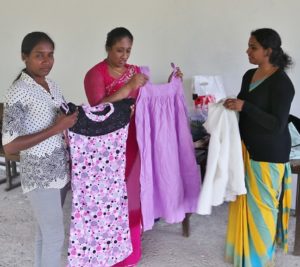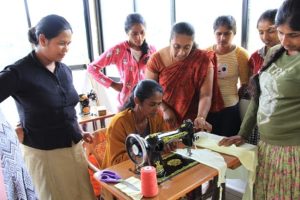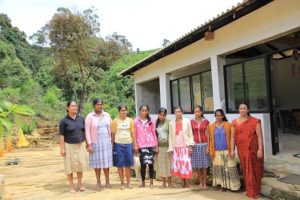Improving Livelihood Opportunities for Women in Nuwara Eliya
UN-Habitat, with funding from the Korea International Cooperation Agency (KOICA) is implementing the project “Human Development Initiative through Empowerment and Settlement Improvement in the Plantation Settlements in Sri Lanka (HDI)” in Nuwara Eliya district.

As part of the project activities, UN-Habitat is providing vocational training opportunities to enhance the capacity and employability of young women and men in the district. A tailoring/stitching training programme was held recently by UN-Habitat in partnership with the National Apprenticeship Training Institute (NAITA). This programme provided training to 10 women in the remote Grama Niladhari (GN) division of Kikiliyamana to improve their skills in sewing and to provide them with an alternative income source.
The Kikiliyamana GN division, with a population of 854 people, is situated in Kothmale Divisional Secretariat (DS) division of Nuwara Eliya District. This GN division consists of three villages – C Quarters, Second Mile Post and Third Mile Post. The nearest towns of Pundaluoya and Nuwara Eliya are located 14 km from the village. The majority of residents in Kikiliyamanna are engaged in agriculture or work in nearby estates.
When UN-Habitat commenced project activities in the area, the communities identified several key needs at a Community Action Planning (CAP) Workshop. These included infrastructure facilities that were lacking in the village such as internal access roads, drainage, a community centre, water supply facility, improvement of preschools, playground and retaining walls. Training on alternative livelihood opportunities for women was also identified as a key need. While the women were keen to gain new skills, they faced financial and logistical difficulties in attending classes in town centres.
UN-Habitat mobilised the communities in Kikiliyamana and surrounding villages to join the vocational training  programme by conducting a career guidance programme and by raising awareness amongst the Grama Niladhari (Village Officers). With ten women joining the programme, the course was held in a community hall in Kikiliyamana village, which was a convenient location for all trainees. A key feature of this programme was the waiving of age restrictions for trainees. This was to give opportunities to all women, in particular those who face difficulties in travelling far from their villages due to various household duties such as childcare, household chores and caring for the elderly.
programme by conducting a career guidance programme and by raising awareness amongst the Grama Niladhari (Village Officers). With ten women joining the programme, the course was held in a community hall in Kikiliyamana village, which was a convenient location for all trainees. A key feature of this programme was the waiving of age restrictions for trainees. This was to give opportunities to all women, in particular those who face difficulties in travelling far from their villages due to various household duties such as childcare, household chores and caring for the elderly.
The HDI project provided funding of LKR.146,000 for this training programme. The programme was conducted with the technical assistance and supervision of NAITA. Five sewing machines and material such as thread, scissors, clothing material, pattern books, needles and other essential accessories were provided to the trainees. None of the trainees had previous knowledge of stitching and this was their first opportunity to obtain a NAITA training. The training module for the programme and an instructor was provided by NAITA together with regular monitoring and supervision by NAITA filed officers.
 The main aspects of the course included operating the sewing machine, learning different types of stitching as well as stitching different items of clothing. During the course of the programme, the trainees have learned to stitch a number of clothing items including shirts, tops, skirts, uniforms, nightwear, winter clothes, dresses and sari blouses. The stitching programme which was of three months’ duration, has now been successfully completed.
The main aspects of the course included operating the sewing machine, learning different types of stitching as well as stitching different items of clothing. During the course of the programme, the trainees have learned to stitch a number of clothing items including shirts, tops, skirts, uniforms, nightwear, winter clothes, dresses and sari blouses. The stitching programme which was of three months’ duration, has now been successfully completed.
“I was initially worried about joining the class with all my household duties, especially as I have to look after my three year old son. But, the organisers were very flexible and I was allowed to bring my son to class. My husband is busy with agriculture work, so this was a very good solution for me. I had no knowledge of sewing before. But now, thanks to our instructor, I have learnt to sew dresses, sari blouses and other items of clothing. I am so happy to have gained this useful skill.” Ms. Nilanthi Kumari, one of the trainees stated.
“I am very happy to see that after following the practical stitching classes, many of the ladies have started stitching their own clothes. Some ladies have purchased their own sewing machines and are now stitching at home” Mrs. Niluka Shyamali De Silva, the instructor of the tailor training course stated.
Mr. U D H de Silva, the NAITA District Manager for Nuwara Eliya commenting on the training programme, said “I want to thank UN-Habitat, the instructor and trainees for making this programme a success. The trainees should not consider this the end of their learning. I encourage them to join NAITA and follow further training programmes in Nuwara Eliya.”
With the end of the three month course, all trainees are now stitching clothes for themselves and their families. Five women are hoping to undertake sewing orders from neighbours and friends in the village and pursue stitching as an alternate livelihood. Due to the high demand for such training programmes from other women in the area, UN Habitat and NAITA have extended this programme to more villages. Hence, the programme will be held in Dayagama West Estate and Pundaluoya with 25 female trainees.
Following the successful completion of training programmes, NAITA has taken the initiative in directing interested women to apparel factories for employment opportunities as sewing machine operators and is also sharing information on available self-employment opportunities of Government supported programmes which facilitate trainees to start their own small-medium scale stitching businesses.
The HDI project is contributing towards human development through capacity building of youth, communities and local authorities; increasing resilience of the communities through settlement planning and community infrastructure; and through awareness creation towards mainstreaming plantation settlements. It is implemented in close collaboration with the Ministry of Hill Country New Villages, Infrastructure and Community Development. It is expected to benefit over 10,000 persons directly and 250,000 persons indirectly in Nuwara Eliya district. The project is being implemented from January to December 2017 in the Kothmale, Nuwara Eliya and Walapane Divisional Secretariat divisions.
